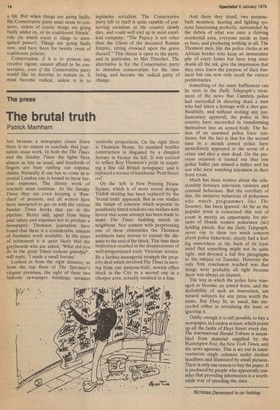The press
The brutal truth
Patrick Mamham
Just because a newspaper closes down there is no reason to conclude that journalists cease work. In both the The Times and the Sunday Times the lights burn almost as late as usual, and hundreds of fingers are busy rattling out expense claims. Naturally if one has to come in to central London one is bound to incur various expenses. The thirsty work of research must continue. At the Sunday Times they are even keeping a 'flowchart' of projects, and all writers have been instructed to get on with the various Sunday Times books that are in the pipeline. Better still, apart from being paid salary and expenses not to produce a newspaper, Thomson journalists have found that there is a considerable amount of freelance work available. In the years of retirement it is quite likely that the greybeards who are asked, 'What did you do in the great Times lockout grandpa?', will reply, 'I made a small fortune'.
Looked at from the right distance, as from the top floor of The Spectator's elegant premises, the sight of these two hideous newspaper buildings assumes symbolic proportions. On the right there is Thomson House. Its standard boxlike construction is disguised by a dimpled fantasy in bronze tin foil. It was erected to reflect Roy Thomson's pride in acquiring a fine old British newspaper, and it replaced a terrace of handsome 'Pont Street red'.
On the left. is New Printing House Square, which is of more recent design. Tinfoil skirting has been replaced by the 'brutal truth' approach. But as one studies' the lumps of concrete which separate its pointlessly tinted windows one realises with horror that some attempt has been made to make The Times building match its neighbour. Not content with perpetrating one of these obscenities the Thomson architects have striven to extend the disaster to the end of the block. This time their inspiration resulted in the disappearance of well-proportioned early Victorian terrace. By a further managerial triumph the property deal which involved The Times in moving from one purpose-built, newish office block in the City to a second one in a cheaper area, actually resulted in a loss. And there they stand, two purposebuilt monsters, heating and lighting systems functioning perfectly, surrounded by the debris of what was once a thriving residential area, everyone inside as busy as bees, and producing nothing at all. The Thomson men, like the police clerks at an African border who keep an immaculate pile of entry forms but have long since drunk all the ink, give the impression that they once knew the purpose of their business but can now only recall the correct preliminaries.
Something of the same bafflement can be seen in the Daily Telegraph's treatment of the news that Cumbria police had succeeded in shooting dead a man who had taken a hostage with a shot gun. Stealthily, and without inviting any parliamentary approval, the police in this country have succeeded in transforming themselves into an armed body. The fiction of an unarmed police force continues, but the fact is that for the second time in a month armed police have immediately appeared at the scene of a crime and shot a man dead. On the previous occasion it turned out that one police bullet just missed a father and his son who were watching television in their front room.
Much has been written about the relationship between television violence and criminal behaviour. But the corollary of this, the imitative behaviour of policemen who watch programmes like The Sweeney, has been ignored. As far as the popular press is concerned this sort of event is merely an opportunity for pictures of blonde women policemen (sic) holding pistols. But the Daily Telegraph, never one to show too much concern about police behaviour, clearly had a feeling somewhere at the back of its loyal mind that something might not be quite right, and devoted a full five paragraphs to the subject on Tuesday. However the only firm conclusion reached was that things were probably all right because there was always an inquest.
The way in which the police have managed to become an armed force, and the desirability of such an innovation, are natural subjects for any press worth the name. But Fleet St, as usual, has succeeded either in trivialising the issue or ignoring it.
Oddly enough it is still possible to buy a newspaper, in London at least, which points up all the faults of Fleet Street every day. The International Herald Tribune is assembled from material supplied by the Washington Post, the New York Times, and the news agencies. This is set out in unadventurous single columns under modest headlines and illustrated by small pictures. There is only one reason to buy the paper. It is produced by people who apparently consider that providing information is a worthwhile way of spending the time.
Nicholas Davenport is on holiday






























 Previous page
Previous page